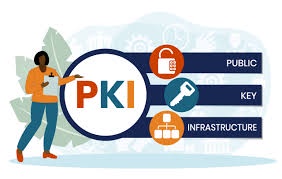Public Key Infrastructure (PKI) development has become the backbone of cybersecurity, ensuring secure communication, data integrity, and user authentication. In this article, we'll delve into the evolution, key elements, modern applications, and challenges of PKI development, shedding light on its significance in various industries.
For More Details: Visit our website
Understanding PKI
At its core, PKI is a framework that manages digital keys and certificates, providing a secure way to exchange information over the internet. The two main components, public and private keys, work in tandem to encrypt and decrypt data, forming the basis of secure communication.
Evolution of PKI
PKI has come a long way since its inception. Initially developed to secure email communication, it has evolved to meet the demands of modern cybersecurity. Today, PKI plays a crucial role in securing online transactions, protecting sensitive data, and authenticating users.
Key Elements of PKI Development
Central to PKI development are Certificate Authorities (CAs), entities responsible for issuing digital certificates, and Registration Authorities (RAs), which verify the identities of users. Digital certificates, containing public keys and additional information, act as the cornerstone of PKI, enabling secure communication.
PKI in Modern Cybersecurity
In the contemporary digital landscape, PKI is instrumental in ensuring the security of online transactions and maintaining the confidentiality and integrity of data. Its applications extend to securing sensitive information in financial transactions, healthcare records, and government databases.
Challenges in PKI Implementation
Despite its effectiveness, PKI implementation comes with challenges. Key management poses a significant issue, with the risk of compromised private keys. Additionally, concerns regarding the trustworthiness of Certificate Authorities can undermine the security of the entire PKI ecosystem.
Best Practices in PKI Development
To mitigate these challenges, organizations must adopt secure key management strategies and conduct regular audits of digital certificates. Continuous updates and adherence to best practices are essential to maintaining the integrity of the PKI infrastructure.
Importance in Data Encryption
PKI plays a pivotal role in data encryption, ensuring that sensitive information remains confidential during transmission. Encryption protocols, such as TLS and SSL, rely on PKI to establish secure channels, safeguarding data from unauthorized access.
PKI and Identity Management
User authentication is a critical aspect of cybersecurity, and PKI seamlessly integrates with identity access management systems. By providing a robust framework for verifying user identities, PKI enhances overall security measures.
The Future of PKI
As technology evolves, so does PKI. Emerging trends, such as quantum-resistant cryptography and decentralized identity solutions, are shaping the future of PKI. Anticipated developments promise enhanced security and adaptability to the evolving threat landscape.
PKI in Various Industries
PKI's applications extend across various industries, including finance, healthcare, and government sectors. Its role in securing financial transactions, protecting patient data, and ensuring the integrity of government databases underscores its versatility.
Case Studies of Successful PKI Implementations
Real-world examples showcase the effectiveness of PKI. From securing online banking transactions to safeguarding electronic health records, these case studies highlight the tangible benefits of robust PKI implementations.
Security Concerns and Solutions
Addressing security concerns is paramount in PKI development. From preventing key compromise to ensuring the trustworthiness of Certificate Authorities, organizations must implement innovative solutions to bolster PKI security.
PKI and Internet of Things (IoT)
With the proliferation of IoT devices, securing communication and data integrity is crucial. PKI provides a foundation for securing IoT devices, addressing challenges associated with authentication and data protection.
Conclusion
In conclusion, PKI development is integral to creating a secure digital environment. From its historical roots to its current applications and future trends, PKI remains a cornerstone of cybersecurity. Organizations must navigate the challenges and embrace best practices to harness the full potential of PKI in safeguarding digital assets.
FAQs (Frequently Asked Questions)
- Is PKI only relevant for large enterprises, or can small businesses benefit from it as well?
PKI is beneficial for organizations of all sizes. Small businesses can leverage PKI for secure communication, data protection, and user authentication.
- How does PKI contribute to the security of online transactions?
PKI ensures the confidentiality and integrity of online transactions by encrypting sensitive information and verifying the authenticity of parties involved.
- Are there any specific industries where PKI is more crucial?
PKI is crucial in industries dealing with sensitive information, such as finance, healthcare, and government, where data security and integrity are paramount.
- What measures can organizations take to address key management issues in PKI?
Organizations can implement secure key management strategies, including regular audits, encryption policies, and secure storage practices.
- How does PKI adapt to emerging technologies, such as quantum-resistant cryptography?
PKI evolves with technology trends, and ongoing research and development aim to integrate quantum-resistant cryptography to ensure long-term security.


No comments yet